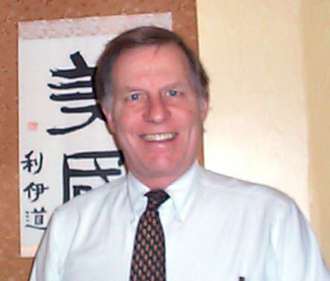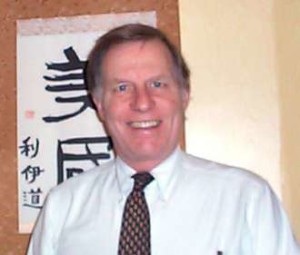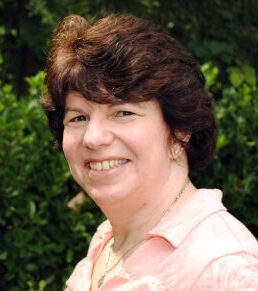T.R. Reid and Health Care Reform
Guest blogger Jonathan Bentley, RN, spends one half of his work-week as a case manager at a rural free clinic and the other half as a care coordinator in a local hospital. He also serves on the governing board of The Canary Coalition, a grassroots clean air advocacy group. Living abroad for several years in Japan and Latin America provided him with direct knowledge of healthcare systems in other countries and a strong desire to contribute to positive change back in the United States. His publications include a chapter in the sixth edition of Policy and Politics in Nursing and Health Care. He lives in the Smoky Mountain region of North Carolina with his wife and daughter.
Bentley writes about his interview with T. R. REID, a journalist known for his coverage of global affairs for The Washington Post, his books and documentary films, and his light-hearted commentaries on National Public Radio. At the Washington Post, he covered Congress and four presidential campaigns. He served as the paper’s bureau chief in Tokyo and in London. Reid has written and hosted documentary films for National Geographic TV, for PBS, and for the A&E network. He is a regular commentator on National Public Radio’s “Morning Edition.” His latest book, The Healing of America, quickly became a national best-seller. Reid was the on-air correspondent for two PBS Frontline documentaries based on that abook.
I first learned of T.R. Reid when I saw his PBS Frontline documentary, Sick Around the World, which outlined the healthcare systems of five other industrialized democracies
and contrasted them with our system in the U.S. Years later I had the opportunity to meet him at an award event for the Japan America Society of Colorado. After agreeing to do an interview, he shared insights gained from his experiences living abroad and researching healthcare systems around the world.
JB: Your most recent book, The Healing of America, has been a huge success. What new projects are you working on in relation to healthcare policy?
TR: I’m making a new PBS documentary film, tentatively titled Saving Lives–and Saving Money. We are constantly told that the cost of health care is out of control. In fact, there are already organizations
providing high quality care at a reasonable cost right here in the USA. Our film looks at what they’re doing, and how others could learn from them. Medicare insures about 46 million people in the U.S., so why don’t they require all providers to use the same systems? In some U.S. counties, Medicare pays $15k per person per year on average; in other counties, the average cost is $5k per person. And the low-cost communities have results that are just as good.
How do they do it? And why don’t Medicare and the big private insurers demand equal standards? This is going to be a PBS documentary, and it should be broadcast in 2011. The filming is done, and now it’s being edited. I’ve also been doing a lot of speeches about how other rich countries manage to cover everyone and spend half as much as we do in the U.S.
JB: This seems to be a continuation of issues you covered in The Healing of America.
TR: Yes. For that book and for the Frontline documentary Sick Around the World, I went around the world looking at how other rich countries cover healthcare. And then people began to tell me, “You can also find high quality care at reasonable cost in many parts of the U.S.” We’ve found that this is true. In fact, we thought initially that in our one-hour film we could cover low-cost communities and then look at some of the high-cost venues. But there were so many good examples that we didn’t have time to cover the bad ones. At the end, we ask, “why don’t big (insurers) require everyone to be efficient?” Is it politics? I think the answer is that high-cost systems have local congressmen who protect them.
The documentary shows there are a lot of different models that provide high value. There’s the Mayo Clinic model, with hundreds of doctors working for one organization. But we also we looked at a town with 88 independent practices, each with 3 to 4 doctors. There are lots of different models that work.
JB: The Affordable Care Act seems to focus largely on extending coverage and reforming the insurance industry while placing relatively little emphasis on improving care delivery. What do you think needs to be changed in terms of how medical services are actually provided in our country?






